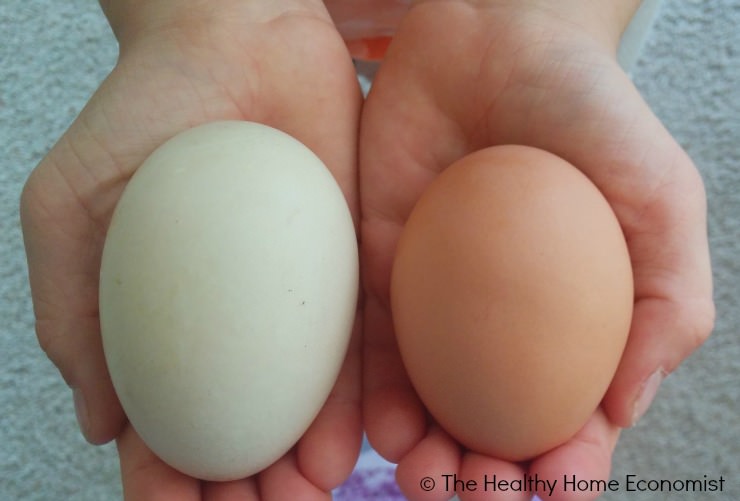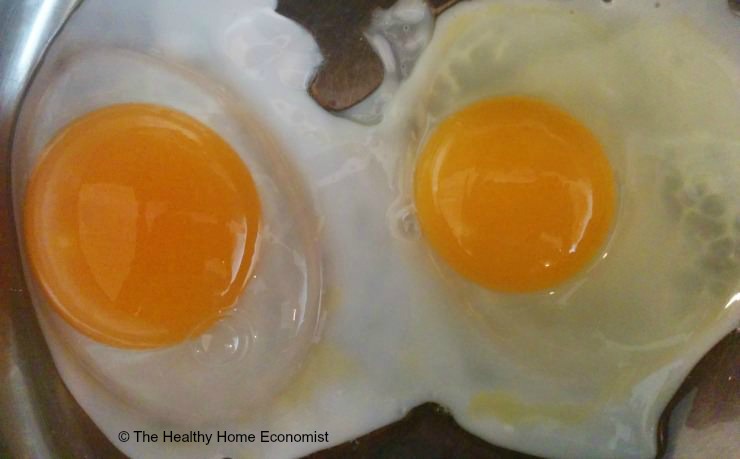 We live on a quiet and peaceful recreational lake that is home to a variety of wildlife including several species of duck.
We live on a quiet and peaceful recreational lake that is home to a variety of wildlife including several species of duck.
While our family adores the incomparable quality of eggs produced by backyard, free-ranging hens, I have always eyed these ducks as a potential source of eggs too.
This especially after visiting Polyface Farm and observing how Joel Salatin (the sustainable, paradigm-busting farmer featured in Michael Pollan’s bestseller The Omnivore’s Dilemma) maintains a flock of ducks for egg laying purposes.
I have occasionally enjoyed duck eggs over the years. Usually, it is a random wild duck egg spied in the yard as a female waddles by, not quite able to make it to her nest before depositing her prize.
Recently, however, one female duck adopted our home and decided that she is one of our chickens.
I’ve tried shooing her away back to her other duck friends many times, but she kept returning to eat the chicken scraps and organic, no soy feed I put out for our layers to supplement their foraging diet. She even goes into the chicken coop while the chickens are out free ranging to sip their water and rest on the straw.
After a while, this duck, who is a muscovy and mallard mix, became so comfortable hanging around our backyard that she decided to give us a real Easter surprise: a down-lined duck nest in our patio bed full of 7 beautiful wild duck eggs!
Duck Eggs Benefits
Duck eggs, especially wild ones, are extremely nutritious and quite a bit different from chicken eggs. Below is an overview of the key variations.
Duck Egg Size
Duck eggs are quite a bit larger than even extra large chicken eggs.
In the picture below, my daughter is holding an extra large chicken egg from one of our backyard hens and a wild duck egg from our new feathered friend.

Duck Egg Nutrition
Due to the larger size, a single duck egg is obviously going to be higher in protein and other nutrients than a corresponding chicken egg. Even after adjusting the nutrients to a per gram level, duck eggs are still the nutritional winner. (1)
Pastry chefs in particular love duck eggs as they are higher in both fat and albumen (egg white). This makes for fluffier, richer baked goods.
A single duck egg compared with a chicken egg contains:
- 6 times the Vitamin D
- 2 times the Vitamin A
- More Vitamin K2 (as MK-4)
- 2 times the beneficial, natural cholesterol
Gram for gram, eggs from ducks are more nutritious than chicken eggs assuming that both are from free-ranging birds that have access to their natural diet. On a macronutrient level, duck eggs have slightly more protein but over 30% more fat – mostly saturated – than chicken eggs.
Mineral content is also higher across the board: calcium, magnesium, phosphorus, potassium, iron, zinc, copper, and selenium.
As might be expected, the higher fat content means a higher proportion of the fat-soluble vitamins, notably A and E which are present in significantly higher amounts per serving.
The water-soluble B vitamins are much higher too. Vitamin B12 is present at 5 times the level in duck eggs as in chicken eggs.
The nutrient that most often scares folks away from duck eggs is cholesterol. Calorie for calorie, duck eggs contain more than twice the natural, beneficial, brain-nourishing cholesterol as chicken eggs. If cholesterol still worries you, know that processed (oxidized) cholesterol in factory foods is the one to avoid. Natural cholesterol as present in ample amounts in duck eggs is a food to be sought out and consumed liberally as practiced by healthy, degenerative disease free ancestral cultures.
Hardness of Duck Egg Shells
Duck eggs, especially wild ones, have incredibly hard shells and deep orange yolks. The yolks are a richer color even than the free-ranging chickens we keep that eat plenty of insects, worms, and grubs.
Duck eggs crack in half perfectly with no splintering and have the look and feel almost like porcelain.
This hard shell means that the eggs are fresh longer.
Duck Egg Color and Yolks
The picture above shows that the color of a duck egg is white. Chicken eggs come in a variety of colors, usually white or brown.
The inside of a duck egg is also different. The picture below is a duck egg and a backyard raised chicken egg cooking side by side in a frying pan.
As you can see, the duck egg has a larger yolk that is slightly richer in color.

Allergic to Chicken Eggs? You May be Able to Eat Duck Eggs
Those who have an allergy to chicken eggs might also suffer cross-reactivity with other types such as goose eggs. Even non-poultry game bird quail eggs may present problems.
However, it is very possible that consumption of alternatives like duck eggs may not produce any symptoms at all.
The only way to know is to try, but do this only under the advice and care of a holistic practitioner. Egg allergies can sometimes trigger anaphylaxis so be very cautious!
Know also that egg allergies potentially can be caused by what the birds are eating, not the eggs themselves. Simply switching to nonGMO, soy and corn free eggs or seeking out eggs from freely foraging birds may solve the problem entirely.
Whatever you try, though, please do not use aquafaba, a dangerous replacement for eggs popularized in some misinformed cooking circles.
Duck Eggs vs Chicken Eggs
Duck eggs aren’t going to replace chicken eggs in popularity anytime soon. If you have the opportunity to enjoy them on occasion, know that they are a delicious and extremely nutritious food to incorporate into your kitchen routine.
Recipes Using Duck Eggs
Looking for recipes using duck eggs? Check out these breakfast egg recipes for a morning boost. Due to their larger size, you will need one less egg for every three chicken eggs called for in the recipe.
And, if you’re like me and enjoy eggs later in the day too, try these egg recipes for lunch and egg recipes for dinnertime.
Sources and More Information
Current Understanding of Egg Allergy
Is Your Egg Allergy a Soy Allergy in Disguise?








Leave a Reply